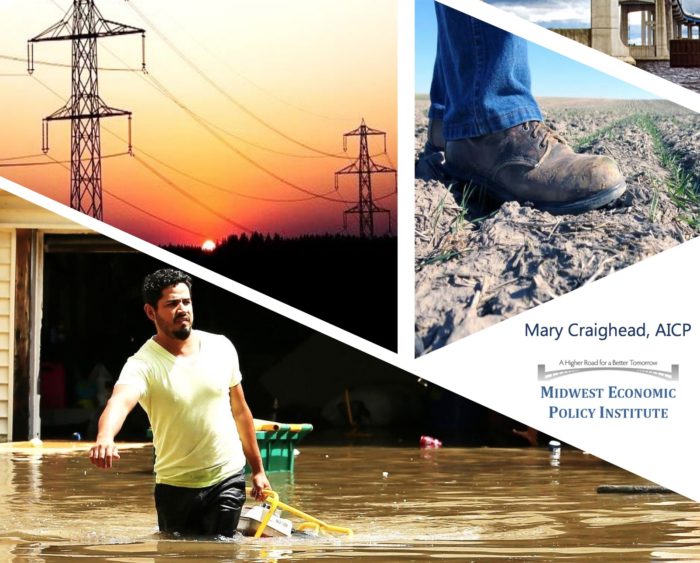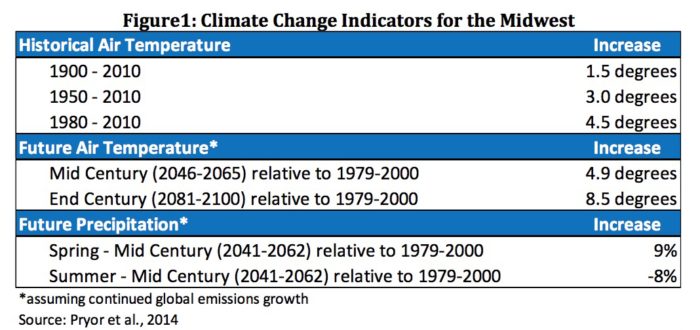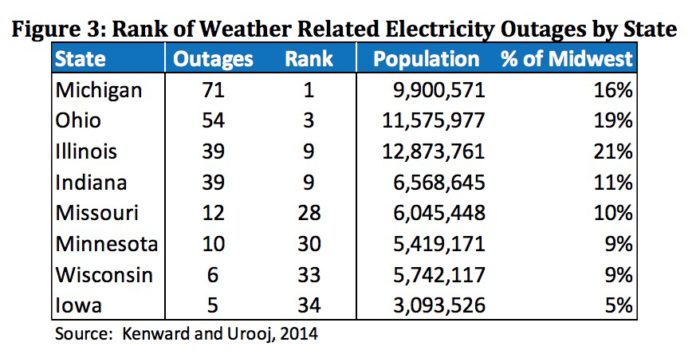MIDWEST ECONOMIC POLICY INSTITUTE
Executive Summary
 The lifeblood of a community is its infrastructure system. In light of Hurricanes Harvey, Irma, and Maria – which are only the most recent examples of extreme weather events to affect the nation – the Midwest Economic Policy Institute (MEPI) has examined the anticipated impact climate change will have on the Midwest.
The lifeblood of a community is its infrastructure system. In light of Hurricanes Harvey, Irma, and Maria – which are only the most recent examples of extreme weather events to affect the nation – the Midwest Economic Policy Institute (MEPI) has examined the anticipated impact climate change will have on the Midwest.
Climate change is observable in the Midwest.
- The Midwest is home to over 61 million people and an expansive transportation network that supports $2.6 trillion in regional gross domestic product.
- The average air temperature in the Midwest increased by 4.5 degrees from 1980 to 2010.
- The percent of days with “very heavy precipitation” has increased by 27 percent in the Midwest since the late 1950s.
- The Great Lakes have experienced less ice coverage, leaving lakeshores susceptible to flooding and erosion.
Climate change-caused damage to transportation systems could result in economic losses.
- Extreme weather conditions will negatively impact the physical conditions of existing infrastructure and increase maintenance costs.
- Increased heat will reduce the life of asphalt, add stress to expansion joints for bridges and highways, cause pavements and railways to buckle, and affect aircraft performance.
- Flooding will weaken structural supports for bridges, deteriorate soil that supports infrastructure, shorten the lifespan of pavement, and increase sedimentation in waterways.
- Damage to significant freight routes or hubs, such as those in Chicago and across the Midwest, would require trade flows to shift, imposing significant economic costs.
The production and distribution of energy can be significantly impacted by climate change.
 The Midwest is a net distributor of electricity to other regions.
The Midwest is a net distributor of electricity to other regions.- Flooding, high winds, ice, snow, and storms can damage facilities and above-ground transmission lines across the Midwest.
- The Midwest is particularly susceptible to electricity outages, with four states ranking among the top 10 states that experienced the most outages between 2003 and 2012.
- Rising temperatures caused by climate change have led to increased demand for cooling and will require $6 billion in future investments to keep up with the region’s needs.
Midwestern states must plan and design infrastructure to address climate change.
- Minnesota and Michigan lead the Midwest in adequately preparing their systems for the effects of climate change, evident by their adoption of Climate Action and Adaptation Plans.
- The state Departments of Transportation in Illinois, Michigan, Ohio, and Minnesota have all pursued asset management programs to address climate change and assess vulnerabilities.
- In transportation projects, climate change can and should be accounted for through the rainfall and heat standards used in the design process.
- New public infrastructure and private developments should be limited or prohibited in unsafe areas that have already experienced weather-related damage.
No one policy or action alone will halt the harmful effects of climate change. While some Midwestern states have taken actions to address negative impacts on infrastructure systems, more needs to be done. As infrastructure investments continue to be debated, climate change and its impact on these systems must also be considered.
Climate Change and Infrastructure
There are few things more important than a region’s infrastructure system for residents and businesses to function and thrive. A dependable transportation system is crucial to ensure the efficient movement of food, energy, and trade, and allows workers and consumers to access jobs and markets. Additionally, energy production and distribution facilities must function reliably to ensure electricity is adequately provided for the region. However, the physical damage to these infrastructure systems and disruption of the services as a result of climate change and increased extreme weather events has the ability to cripple the region and cause significant economic and personal losses (Schwartz et al., 2014).
Transportation
As average temperatures increase and major flooding events become more common, transportation infrastructure – including roads, bridges, public transit systems, railroads, airports, ports, and waterways – will be adversely impacted throughout the Midwest.
Most basically, extreme weather conditions will negatively impact the physical conditions of existing infrastructure that can take months and years to repair and will increase overall maintenance costs. Increased heat will reduce the life of asphalt, add stress to expansion joints for bridges and highways, cause pavements and railways to buckle, and affect aircraft performance (Schwartz et al., 2014). Flooding will weaken structural supports for bridges, promote deterioration of soil that supports roadways, tunnels, and bridges, shorten the life expectancy of pavement, and increase sedimentation in waterway channels (EPA, 2017). Lastly, more frequent freeze-thaw cycles common to the Midwest will add stress to pavements (Cambridge Systematics, Inc. and MDOT, n.d.).
In addition to these physical damages, the impact will be amplified as the consequences of these damages disrupt the transportation network and its ability to transport needed goods and people. Both initially during a weather event and after as damages are being assessed and repaired, transportation systems can become entirely unusable due to flooding, debris, or damage. Flooding can lead to homes and businesses being cut off from needed supplies and also contribute to inland waterways being unsafe. Conversely, droughts will also disrupt waterway travel, particularly impactful for freight movements on barges, if water levels are too low and vessels cannot pass (Schwartz et al., 2014).
As true with any network, disabling any one crucial link will result in a ripple effect throughout the entire system; this is truest of freight movements. Damage to significant freight routes or hubs, such as those in Chicago and across the Midwest, will cause delays and disruptions nationwide as trucks, trains, ships, and barges will no longer be able to use the most efficient route. Trade flows would be required to shift and economic costs would be significant (Schwartz et al., 2014).
Electricity
Similar to the transportation network, the production and distribution of energy can be significantly impacted by climate change and extreme weather events. As an example of one of the most vital energy systems in the country, the electricity network consists of power plants that generate power, transmission lines that carry the power, and finally substations that distribute the power to communities. All of these facilities are susceptible to damage as a result of climate change-influenced weather events (Kenward and Urooj, 2014). Energy infrastructure also includes the transportation facilities – like railroads, highways, and waterways – used to transport coal, crude oil, or other energy related commodities (Dell et al., 2014).
Flooding has the potential to impact power generating facilities and high winds, ice, snow, and electrical storms can damage transmission lines. These risks are particularly evident in the Midwest, where the majority of electricity transmission and distribution is above ground (Kenward and Urooj, 2014). As illustrated in Figure 3, the Midwest is particularly susceptible to electricity outages due to weather events, with four of the eight Midwest states ranking among the top 10 states that experienced the most outages between 2003 and 2012. Those four states comprise 67 percent of the region’s population and experienced 203 total outages. The outage rates speak to both the increase in the number of extreme weather events and the need for infrastructure protection against these events.
Furthermore, energy production and its sources – such as coal, oil, and natural gas– are not isolated by region; a significant proportion of national energy facilities are located along the Gulf of Mexico and its vulnerability to hurricanes can impact energy production nationwide (Dell et al., 2014). Similarly, due to the nature of energy production and its transmission to various areas, infrastructure damages pose significant risks to widespread regions, as exemplified by the Midwest serving as a net distributor of electricity to other regions (Pryor et al., 2014).
Beyond production and distribution, climate change will impact overall energy use. Increased temperatures have already led to increased demand for cooling for households and businesses. The demand for heating in the Midwest has typically been five to seven times that of cooling, however longer summers and higher temperatures are expected to alter this ratio (Pryor et al., 2014). As a result, the electrical grid will face additional stress, as cooling is performed almost exclusively through electricity, whereas heating is divided between electricity, natural gas, heating oil, and other sources (Dell et al., 2014). The increased demand will require significant infrastructure investments to keep up with the region’s needs; by the middle of the century, demand in the Midwest is expected to be equivalent to five large power generating plants and require over $6 billion in total investments (Pryor et al., 2014).
Download full version (PDF): Climate Change and Its Impact on Infrastructure Systems in the Midwest
About the Midwest Economic Policy Institute (MEPI)
midwestepi.org
The Midwest Economic Policy Institute (MEPI) is an associated organization of the Illinois Economic Policy Institute. The Midwest Economic Policy Institute is used when the researched policy, project, or market primarily impacts the Midwest region extending beyond the borders of Illinois. The Midwest Economic Policy Institute believes states must collaborate and learn from one another to build a high-road economy that works for all families. To that aim, MEPI supports timely, candid, and dynamic research on major subjects affecting Midwestern economies, specializing in infrastructure investment and the construction industry. MEPI educates the public and lawmakers through reports, publications, forums, conferences, the media, and social media.
Tags: Climate Change and Infrastructure, Flooding, Great Lakes, MEPI, Midwest Economic Policy Institute, Midwest EPI, Shipping






 RSS Feed
RSS Feed